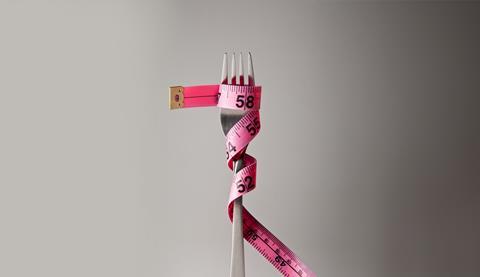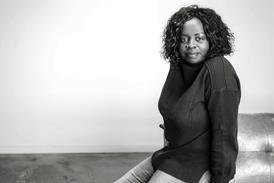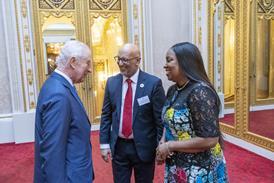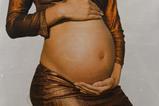Hope Virgo urges us to take time among the festivities of the season to be more mindful of those around us and the struggles they may have

Christmas is ‘supposed’ to be a time of happiness – a time for eating, drinking, remembering loved ones and creating memories. Well that’s what society, social media and TV shows want us to believe. But the reality is there are so many people who find this time of year really tough. This is certainly true for those affected by eating disorders, as it throws in another complicated layer. Christmas has become a massively commercialised event, one that has perhaps lost so much of its meaning. A time of year when people binge eat for a few days and then restrict themselves afterwards to shift whatever extra weight and feelings of guilt they have!
In the days leading up to Christmas I would panic about what food was going to be there
I remember the Christmases when I was in the grips of anorexia; I would do everything I could do to avoid being around at meals. In the days leading up to Christmas I would panic about what food was going to be there on the day. Then on the day itself, I was consumed with thoughts about food, exercise and calories. During my recovery I had no idea how to eat, and felt so wrong in myself because I didn’t feel like I was like anyone else. I had such intense ruminating thoughts that I just wanted to give up.
And I know that my experience and feelings about Christmas aren’t unique to me but impact hundreds, if not thousands, of people each year.
Stories of those suffering
I sat down with Lauren, 19 from Hull who started struggling with her eating when she was twelve. “I got referred to Child and Adolescent Mental Health Services (CAMHS) eating disorder services at 14 but they refused to give me any proper help as I wasn’t underweight. My relationship with food continued to be a massive struggle and I started to binge eat as comfort.” During the pandemic, Lauren managed to speak to a someone at an eating disorder charity and accepted she needed some help.
Lauren told me: “Having an eating disorder makes Christmas more challenging, as a lot of the festive period is focused on food. I often worry in the time leading up to Christmas about managing things like Christmas dinner and parties where food is involved, and find myself planning excuses to try and get out of events – to get out of having to eat in front of people. I’ve found being a Christian makes this slightly easier, though, as the focus of Christmas is about the celebration of Jesus and how significant his birth is for us as Christians.”
I thought back over my own recovery and since becoming a Christian, I definitely used this as a reminder to get through this season. But if it was as easy as that none of us would struggle at all at Christmas!
Lauren offers this advice: “For those struggling, I’d highly recommend looking at what services and events are happening at local churches in your area and put them in your calendar as part of your Christmas plan. For anyone wanting to support someone with an eating disorder through the festive period I’d recommend talking to them about their worries, sitting down with them and planning key events and praying with them.
Letting someone who is struggling know you are praying for them can mean so much
I think prayer is such a powerful and important thing for Christians and letting someone who is struggling know you are praying for them can mean so much to them.”
It isn’t just those affected by anorexia who struggle with Christmas. Annie MacDonald, 31 has lived with binge-eating disorder since she moved to university aged 18. “I was homesick, had little money and the money I did have, I was spending on nights out. I began putting on weight and then started joining weight loss clubs, which led me into the ‘binge-restrict’ cycle. I was out of control and felt I couldn’t stop. I lived like this for a decade until the COVID lockdown really shone a light on my disordered eating, as I was no longer able to hide it so well. I managed to find some support.”
Annie went on: “My main worries at Christmas are feeling like I need to restrict after eating more than I would normally and also not being in my own environment and being unable to control the food around me.”
I could completely relate to that fear of being outside of my comfort zone with food. Learning to speak up and also surrounding myself with the right people was key!
Annie explained: “I would want someone to support me through Christmas by talking openly with me about the challenges I feel and also being mindful of not continually offering me food if I have previously declined. For me, God is in my recovery because he tells us not to worry about anything, which includes what we eat or drink. He does not want us to be anxious about our bodies. God helps me to remember that I am more than clothing and food; I am a person with a good soul and a lot of love and cheer to spread, especially at Christmas.”
Looking back over the last decade, and ahead to Christmas this year, I know I still have some healing to do. But I now know that, despite my worries and fears, I can actually enjoy Christmas – and you can get there too!
Caring for yourself or someone else during Christmas
If you have an eating disorder:
Make a plan for the season (such as when meals will be, when you will be seeing friends or family, when you will make time for self-care)
Distract yourself in moments that feel like they could get overwhelming (with simple things like washing up, painting your nails, reading, playing a board game)
Where possible surround yourself with people who are understanding
Be mindful of how much you look at
social media
Talk about how you feel
Be aware of helplines and places to get support if needed
Supporting a loved one this Christmas:
Plan activities away from meal times
Be mindful of what you say about food
and exercise
Set boundaries with relatives who may talk about food and comment on body size
Make a plan for the season (see above)
Remember eating disorders aren’t actually about food, so find space to check in on how your loved one is doing
Distract your loved ones when necessary (see above)
Take time for yourself
































No comments yet